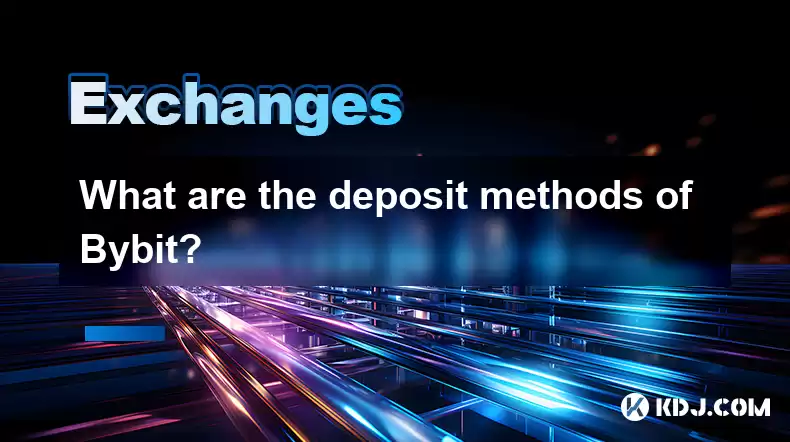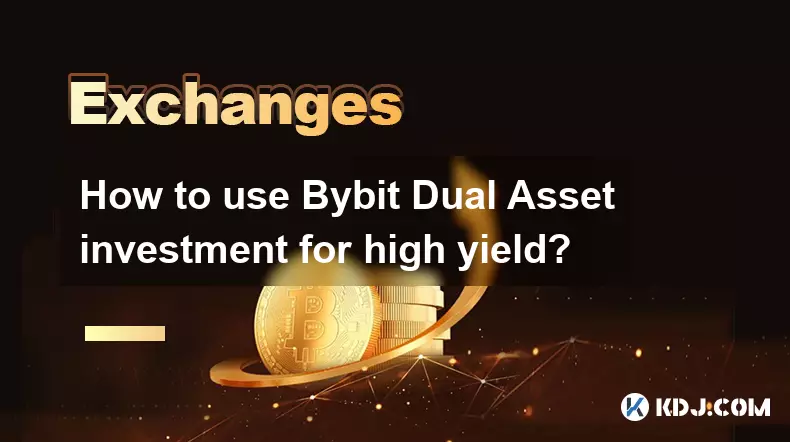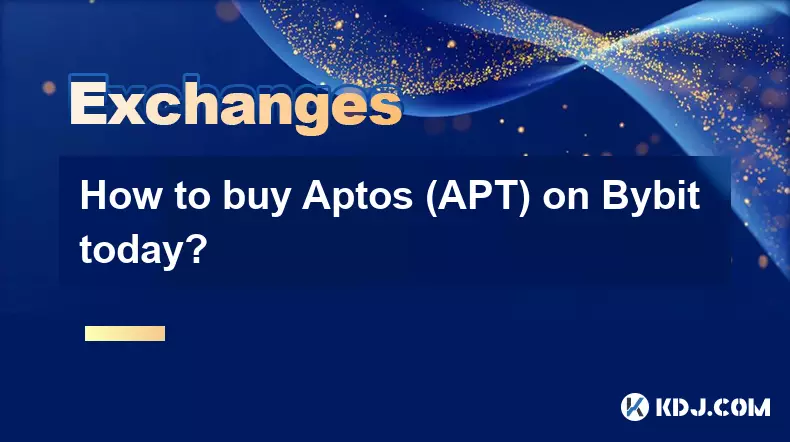-
 bitcoin
bitcoin $87959.907984 USD
1.34% -
 ethereum
ethereum $2920.497338 USD
3.04% -
 tether
tether $0.999775 USD
0.00% -
 xrp
xrp $2.237324 USD
8.12% -
 bnb
bnb $860.243768 USD
0.90% -
 solana
solana $138.089498 USD
5.43% -
 usd-coin
usd-coin $0.999807 USD
0.01% -
 tron
tron $0.272801 USD
-1.53% -
 dogecoin
dogecoin $0.150904 USD
2.96% -
 cardano
cardano $0.421635 USD
1.97% -
 hyperliquid
hyperliquid $32.152445 USD
2.23% -
 bitcoin-cash
bitcoin-cash $533.301069 USD
-1.94% -
 chainlink
chainlink $12.953417 USD
2.68% -
 unus-sed-leo
unus-sed-leo $9.535951 USD
0.73% -
 zcash
zcash $521.483386 USD
-2.87%
What are the deposit methods of Bybit?
Bybit supports deposits in BTC, ETH, USDT, and more, but not fiat; always double-check addresses to avoid permanent loss of funds.
Mar 29, 2025 at 09:35 pm

Bybit, a popular cryptocurrency exchange, offers a variety of deposit methods to cater to its global user base. Understanding these options is crucial for efficiently funding your trading account. This article details the available deposit methods and addresses common queries regarding the process.
Understanding Bybit's Deposit Methods
Bybit primarily focuses on cryptocurrency deposits, reflecting its core function as a crypto-to-crypto exchange. This means you won't find traditional fiat currency options like bank transfers or credit/debit cards directly available for depositing funds. Instead, you'll deposit cryptocurrencies directly into your Bybit account. The specific cryptocurrencies accepted may vary over time, so it’s always advisable to check the platform directly for the most up-to-date information.
The process is generally straightforward, but understanding the nuances of each cryptocurrency and its network fees is essential to avoid delays or unexpected costs. Network congestion can also affect transaction times, so be prepared for potential variations in processing speed. Always double-check the deposit address before sending funds to prevent irreversible loss of your assets.
Supported Cryptocurrencies for Deposits
Bybit supports a wide range of cryptocurrencies for deposits. Some of the most commonly used include Bitcoin (BTC), Ethereum (ETH), Tether (USDT), USD Coin (USDC), and Binance Coin (BNB). However, this list is not exhaustive, and the availability of specific cryptocurrencies might change depending on market conditions and Bybit's internal policies. You should always consult the official Bybit website for the most current list of supported deposit cryptocurrencies.
It is crucial to note that depositing the wrong cryptocurrency to the wrong address will result in the permanent loss of your funds. Always verify the deposit address multiple times before initiating a transaction.
Step-by-Step Guide to Depositing Crypto on Bybit
Depositing cryptocurrency on Bybit is a relatively simple process. Here’s a step-by-step guide:
- Log in to your Bybit account: Ensure you have a verified account before proceeding.
- Navigate to the 'Assets' section: This section usually is easily accessible from the main menu.
- Select 'Deposit': This option will usually be clearly labeled.
- Choose the cryptocurrency: Select the cryptocurrency you wish to deposit from the dropdown menu.
- Copy the deposit address: Carefully copy the unique deposit address generated for your chosen cryptocurrency.
- Send the cryptocurrency: Use your external cryptocurrency wallet to send the desired amount to the provided Bybit deposit address. Remember to account for network fees.
- Confirm the transaction: Once the transaction is initiated on your external wallet, confirm it.
- Monitor the deposit: It may take some time for the deposit to reflect in your Bybit account, depending on network congestion.
Remember to double-check the deposit address before sending any funds. Incorrect addresses will lead to the permanent loss of your cryptocurrency. Always use a reputable and secure external wallet.
Understanding Network Fees
Network fees, also known as transaction fees or gas fees, are charges levied by the blockchain network for processing transactions. These fees vary depending on the cryptocurrency and the network's congestion. Higher congestion generally leads to higher fees. Bybit does not control these fees; they are inherent to the blockchain network.
Always factor in network fees when calculating the amount of cryptocurrency to send. Sending an insufficient amount may result in your transaction failing to be processed completely, and you may lose some or all of your funds.
Security Considerations When Depositing on Bybit
Security is paramount when handling cryptocurrencies. Bybit employs various security measures to protect user funds, but individual users also have a responsibility to protect themselves.
- Use a strong password: Choose a complex and unique password for your Bybit account.
- Enable two-factor authentication (2FA): This adds an extra layer of security to your account.
- Only use official Bybit links: Be wary of phishing attempts that may try to steal your login credentials.
- Never share your private keys or seed phrases: These are essential for accessing your cryptocurrency.
Always prioritize security when managing your cryptocurrency assets. A compromised account could lead to the loss of your funds.
Frequently Asked Questions (FAQs)
Q: How long does it take for a cryptocurrency deposit to be reflected in my Bybit account?A: The processing time varies depending on the cryptocurrency and the network's congestion. It can range from a few minutes to several hours.
Q: What happens if I send the wrong cryptocurrency to my Bybit deposit address?A: You will permanently lose your funds. There is no way to recover them. Always double-check the deposit address and the cryptocurrency type before sending.
Q: What if my deposit doesn't show up in my Bybit account after a considerable time?A: Contact Bybit's customer support immediately. They can investigate the transaction and assist you in resolving the issue. Provide them with your transaction hash ID.
Q: Does Bybit charge any fees for depositing cryptocurrency?A: Bybit itself does not charge deposit fees. However, you will need to pay network fees, which are charged by the blockchain network itself.
Q: Are there any limits on the amount of cryptocurrency I can deposit?A: Yes, there may be limits depending on the cryptocurrency and your account verification level. Check Bybit's website for the most up-to-date information on deposit limits.
Q: What should I do if I suspect my Bybit account has been compromised?A: Immediately change your password, enable 2FA if you haven't already, and contact Bybit's customer support. They can help you secure your account and investigate any suspicious activity. Consider contacting your local authorities if you suspect fraudulent activity.
Q: Can I deposit fiat currency directly into my Bybit account?A: No, Bybit primarily supports cryptocurrency deposits. You may need to use a third-party service to convert fiat currency to cryptocurrency before depositing it on Bybit.
Disclaimer:info@kdj.com
The information provided is not trading advice. kdj.com does not assume any responsibility for any investments made based on the information provided in this article. Cryptocurrencies are highly volatile and it is highly recommended that you invest with caution after thorough research!
If you believe that the content used on this website infringes your copyright, please contact us immediately (info@kdj.com) and we will delete it promptly.
- Mitsubishi Gas Chemical: Decoding the Future Power Hype Analysis
- 2026-02-10 09:45:02
- Congressman Aderholt's Commemorative Coin Bill Unites House for America's 250th Anniversary
- 2026-02-10 09:55:02
- Rotorua's Parking Predicament: Will Coins Cash Out in the City of Sulphur?
- 2026-02-10 06:55:01
- PEPE Price Navigates Treacherous Waters: Key Support Under Siege Amid Relentless Bear Pressure
- 2026-02-10 07:35:01
- Binance, Ripple (XRP), and Altcoins: A Market Shake-Up on the Horizon
- 2026-02-10 07:30:02
- The Shifting Stages of Honor, the Kennedy Center, and Modern Philanthropy
- 2026-02-10 07:20:02
Related knowledge

How to buy JasmyCoin (JASMY) on Bybit?
Feb 09,2026 at 03:40am
Creating a Bybit Account1. Navigate to the official Bybit website and click the 'Sign Up' button located in the top-right corner. 2. Enter a valid ema...

How to contact Bybit customer support for urgent help?
Feb 05,2026 at 11:40pm
Accessing Bybit Support via Live Chat1. Log in to your Bybit account using the official website or mobile application. 2. Navigate to the Help Center ...

How to buy Injective (INJ) on Bybit in 2026?
Feb 09,2026 at 05:39pm
Account Registration and Verification Process1. Navigate to the official Bybit website and click the “Sign Up” button located in the top-right corner....

How to use Bybit Dual Asset investment for high yield?
Feb 06,2026 at 12:20am
Understanding Bybit Dual Asset Investment Mechanics1. Dual Asset Investment is a structured product offered by Bybit that combines a stablecoin deposi...

How to fix Bybit login issues quickly?
Feb 09,2026 at 06:00am
Troubleshooting Common Authentication Errors1. Incorrect credentials often trigger immediate rejection during Bybit login attempts. Users frequently o...

How to buy Aptos (APT) on Bybit today?
Feb 06,2026 at 07:40am
Creating a Bybit Account1. Navigate to the official Bybit website and click the “Sign Up” button located at the top right corner of the homepage. Ente...

How to buy JasmyCoin (JASMY) on Bybit?
Feb 09,2026 at 03:40am
Creating a Bybit Account1. Navigate to the official Bybit website and click the 'Sign Up' button located in the top-right corner. 2. Enter a valid ema...

How to contact Bybit customer support for urgent help?
Feb 05,2026 at 11:40pm
Accessing Bybit Support via Live Chat1. Log in to your Bybit account using the official website or mobile application. 2. Navigate to the Help Center ...

How to buy Injective (INJ) on Bybit in 2026?
Feb 09,2026 at 05:39pm
Account Registration and Verification Process1. Navigate to the official Bybit website and click the “Sign Up” button located in the top-right corner....

How to use Bybit Dual Asset investment for high yield?
Feb 06,2026 at 12:20am
Understanding Bybit Dual Asset Investment Mechanics1. Dual Asset Investment is a structured product offered by Bybit that combines a stablecoin deposi...

How to fix Bybit login issues quickly?
Feb 09,2026 at 06:00am
Troubleshooting Common Authentication Errors1. Incorrect credentials often trigger immediate rejection during Bybit login attempts. Users frequently o...

How to buy Aptos (APT) on Bybit today?
Feb 06,2026 at 07:40am
Creating a Bybit Account1. Navigate to the official Bybit website and click the “Sign Up” button located at the top right corner of the homepage. Ente...
See all articles










































































